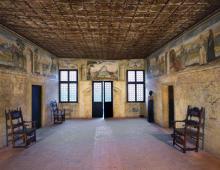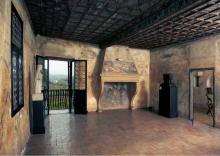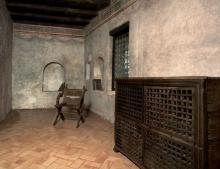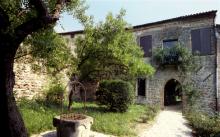Casa del Petrarca
This 13th century house still maintains most of its original 14th century features, despite the many restorations and alterations. In the 16th century, a loggia was added and the rooms were frescoed with scenes inspired by Petrarch's most famous works, his “Song Book” and “Africa”.
Petrarch was born in 1304 in Arezzo, Tuscany, and died in in 1374 in Arquà, Veneto. In 1369, Petrarch was old, ill and tired of his continuous wanderings, therefore he had a house restored in Arquà, a village in the Euganean hills, which he chose as a refuge for his twilight years. There he was surrounded by old and new friends and relatives: his daughter Francesca, his son-in-law Francescuolo and his granddaughter Eletta.
He continued his studies until he died during the night between 18th and 19th July 1374, with his head resting on his beloved books.
The house may have been donated to Petrarch by Francesco I da Carrara, Lord of Padua, and one of his closest friends. Petrarch decided to have it restored, overseeing the restoration himself. He joined the two pre-existing buildings and used the mezzanine floor of the one on the left as a house for himself and his family. His domestic staff lived on the top floor of the right-hand building, where the main entrance was. In the front there was a garden and, in the back, an orchard: he attended to his plants, but not always with the best results. He had the layout of the rooms changed so that the main room of the left-hand building became a lounge with a fireplace leading to the other rooms. The lounge was lit by a large window overlooking the garden.
The room on the left was split in two to create a small study. The windows were renovated in the Gothic style and two balconies and three chimneys were added.
The owners that came after Petrarch did not make any drastic changes to the house, to honour the poet's memory. The house was already becoming well-known for its association with Petrarch's life, and grew to be a place of literary and sentimental pilgrimage.
In the mid 16th century, Paolo Valdezocco, the then-owner who had the house frescoed, partially changed the layout of the rooms, and he had the loggia and the external stairs leading to the upper floor added. The house was considered a museum by Petrarch's admirers. The City of Padua inherited the house on 6th February 1876 from its last private owner, Cardinal Pietro Silvestri.
In 1906, restoration work on the building began, leaving the entrance unchanged and removing the superfluous details that had been added in previous restorations. The works were was finished in 1985.
On display inside are editions of the poet's works and some words written by admirers during the centuries. In this small house-museum are his study room, what was once his library and, among the objects belonging to the poet, his chair and his legendary stuffed cat.
Info
Tel. +39 0429 718294
Opening hours: 9.00 am -12.30 pm / 3.00 pm -7.00 pm from 1st March to 31st ctober; 09.00 am -12.30 pm / 2.30 pm – 5.30 pm from 1st November to 28th February.
Admission is allowed until half an hour before closing time.
Closed on Mondays, Christmas Day, Boxing Day, New Year's Day, 1st May.
Tickets - € 5.00
Concessions - € 3.00: Groups of 10 or more; EU Senior citizens (over 65); Residents of Padua and province; Municipal employees; Tourist guides.
School concessions - €2.00: Students of all ages; Teachers; School concessions - €1.00: Students who participate in museum workshops;
Free: Children under 5 years of age; Disabled visitors and assistants; Journalists; Teachers with groups of students; Tourist guides with groups; ICOM pass holders; Residents of Padua and province on the first Sunday of the month.
Multiple entry tickets
Booking is required for groups and schools: +39 0429 718294 or via email: info.casadelpetrarca@gmail.com
Photography regulations: photography is allowed for private purposes only;
• the objects on display may not be touched;
• flashes and other lighting equipment are not allowed;
• tripods may not be used inside the museum.
translated by Beatrice Barbarato, Queen Chiamaka Uzoma, Gianmarco Da Molin, Francesca Degan, Giovanni Panazzolo, Arianna Perissinotto, with prof. Elisabetta Bacchini, Elisa Carrà and dr. Andew Bailey, thanks to POT 7 UniSco - Dipartimento di Studi Linguistici e letterari of the University of Padua











